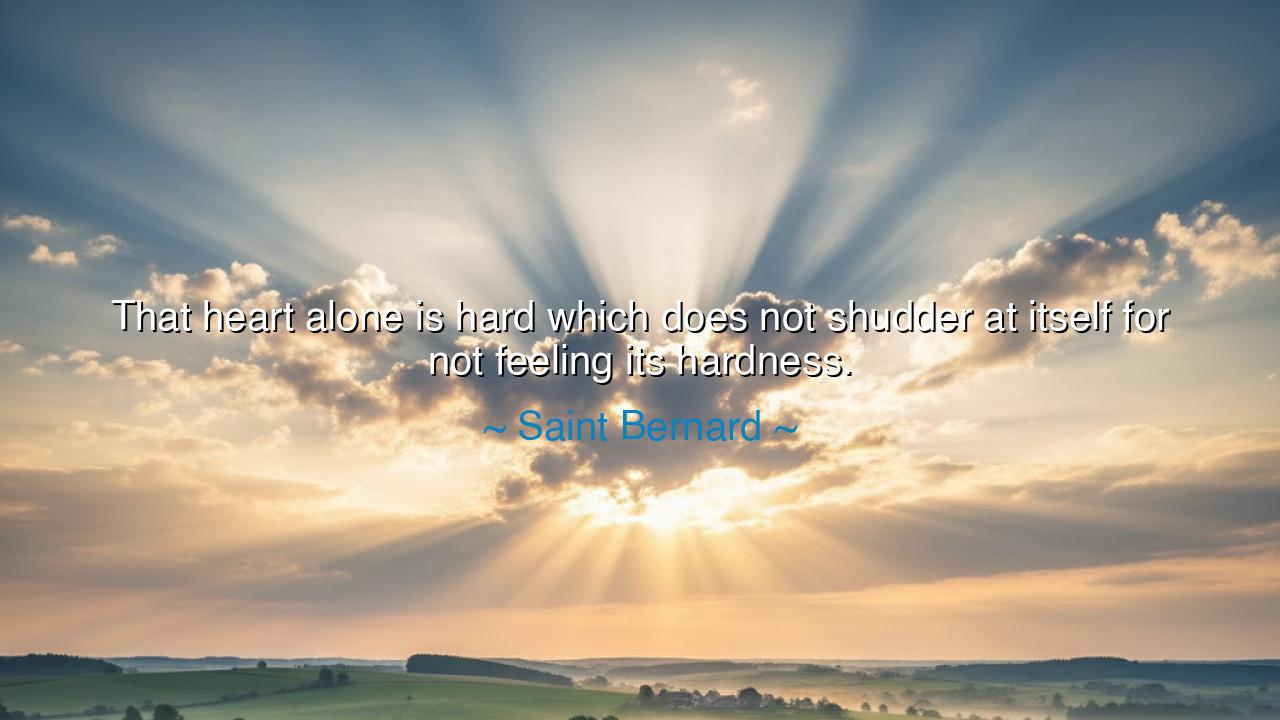
That heart alone is hard which does not shudder at itself for not
That heart alone is hard which does not shudder at itself for not feeling its hardness.






"That heart alone is hard which does not shudder at itself for not feeling its hardness." These words of Saint Bernard strike at the very core of humanity’s deepest spiritual truth—that true growth and moral strength are not found in the absence of vulnerability, but in the awareness of our own imperfections. Saint Bernard’s profound insight reveals the paradox that the hardest heart is not one that is firm, unyielding, and unemotional, but one that is so disconnected from its own moral compass that it does not recognize its own hardness. True softness of heart is found when one is able to shudder, to feel a sense of sorrow or remorse for the hardness that may have taken root within.
The ancient philosophers were keenly aware of the delicate balance between strength and compassion. Aristotle spoke of the virtuous man—one whose character was formed by moderation and wisdom. The hardness Saint Bernard speaks of is not the strength of virtue, but the coldness that comes from indifference—the inability to feel for others and for oneself. Socrates, in his search for truth, emphasized the importance of self-awareness. He believed that the true wisdom was not in knowing everything but in knowing one's own limitations and flaws. The hardness of heart is a denial of this self-awareness, a refusal to engage with one’s inner weaknesses and vulnerabilities.
Consider the life of Alexander the Great, whose military genius was unrivaled, but whose heart was at times marked by cruelty and pride. His conquest of the known world was achieved with force and determination, but in the later years of his life, his sense of invincibility and hardness of heart became a burden. When Alexander’s close companion Hephaestion died, Alexander’s reaction was a tragic testament to his emotional hardness. Overcome with grief, he ordered his men to mourn as if Hephaestion were a god, even though, in life, Alexander had often been disconnected from his own deeper emotions. The story reflects that hardness is not a mark of strength but a mask that conceals the inability to confront one’s vulnerabilities and human emotions. Even the greatest conqueror, when faced with the loss of someone dear, could not escape the deeper recognition of his own fragility.
Saint Bernard’s wisdom invites us to recognize that true courage comes from confronting our own hardness of heart. The shuddering of the heart is not a sign of weakness, but of spiritual growth—it is a wake-up call to the presence of our own moral struggles and the need for compassion. The wise man, or woman, is not one who lives without hardness in their heart but one who can feel and reflect on it. When we are able to experience remorse or sorrow for the times we have been emotionally cold or disconnected from others, we open the door to growth. This emotional engagement is not about perfection but about acknowledging our humanity and striving to become better.
Take the example of Nelson Mandela, whose leadership was defined not by a heart of stone but by a deep sense of compassion. After spending 27 years in prison, Mandela could have emerged hardened by his suffering, but instead, he found it within himself to forgive his oppressors and work toward reconciliation for the good of South Africa. His strength was not in the absence of emotion but in his ability to shudder at the hardness of his own experiences and recognize that true leadership and freedom came through compassion and understanding.
The lesson Saint Bernard offers us is one of self-awareness and humility. It is easy to become hardened in the face of life’s challenges—whether it be betrayal, loss, or suffering. But to acknowledge this hardness is the first step toward healing. Compassion and forgiveness are not signs of weakness but of strength, and they begin with self-reflection. Let us ask ourselves: Do we shudder at our own moments of indifference, pride, or cruelty? When we do, we begin to peel away the layers of hardness and open our hearts to the truth of who we are, and who we can become.
In our daily lives, let us strive to cultivate softness of heart, not by avoiding our vulnerabilities, but by embracing them. Let us reflect on our actions and their impact on others. Rather than allowing hardness to take root, let us confront it with compassion, understanding, and the willingness to grow. By doing so, we not only free ourselves but also create a world where hearts are not hardened by fear, but softened by the courage to love, forgive, and heal.






AAdministratorAdministrator
Welcome, honored guests. Please leave a comment, we will respond soon